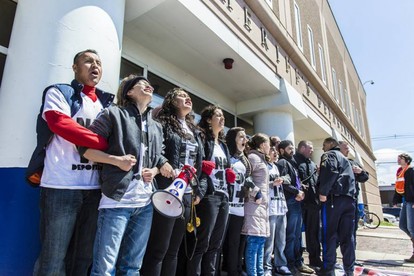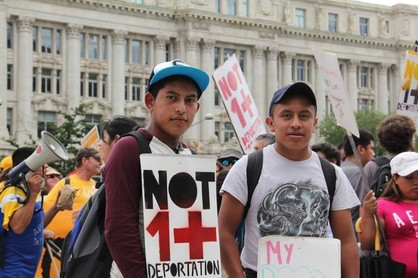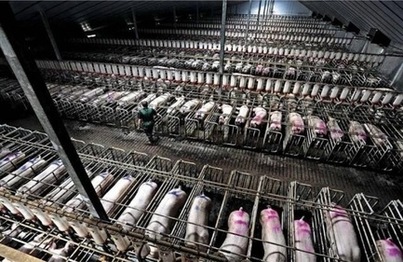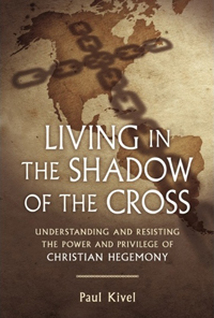 AMARYAH SHAYE JONES-ARMSTRONG: WHITENESS/CREDIT AS A DEFORMED THEOLOGICAL ANTHROPOLOGY The telos of border imperialism as described by Walia and served by policies like the Priority Enforcement program is manifestly blasphemous on any number of levels. The most obvious, and the most commonly identified by theologians is that it denies the presence of Christ in the persons of exploited, oppressed, colonized, and working people. On Good Friday 2013, in the middle of the campaign for Jose Maria Islas, over 200 of us gathered on the New Haven Green for a rally against Secure Communities under the banner Deportation Crucifies. The claim was simple: racist state violence is crucifying violence against the body of Christ, whose very flesh is the people. Christ identifies with every person in a deportation process, every person whose wages are stolen because they are undocumented, every person who is racially profiled by the police, every person under arrest or in detention, and, in so doing, reveals Barack Obama (and any other deporter-in-chief) to be a modern day Pontius Pilate.
Note: This article originally appeared at Political Theology GregoryWilliams  On 13 August, the main floor of the New Haven People’s Center was characteristically hot and unusually crowded for a late summer evening. About half a dozen lawyers, nonprofit workers, and labor union staff were there for a meeting of the Connecticut Immigrant Rights Alliance. So, too, were scores of rank and file members of the New Haven Workers’ Association – Unidad Latina en Accion (a group that I worked with as a white co-conspirator for three years and am very thankful to for giving me permission to write this article, as well as some guidance as to its content). The subject of the meeting was ICE’s new “Priority Enforcement Program” (PEP), the latest instantiation of information-sharing between immigration and local law enforcement, which now threatens to make not only police stations, but also probation offices, drug treatment programs, and other elements of the criminal (in)justice system unsafe places for immigrants, places where they could easily be handed over to immigration and taken away from their family in chains. “It can happen to anyone” and “it can happen anywhere” were the twin themes of the evening. To me, and to a growing number of Jesus-followers in this country, it is patently obvious that the complex of policies, institutions, discourses, and practices known collectively as “the immigration system” violates every possible standard of hospitality—not to mention basic justice—that could conceivably be adopted within a recognizably Christian social ethic. Excellent work has already been and is currently being done to flesh this out by far more able theologians than me. A prime example of this is the excellent documentary Trails of Hope and Terror recently written by Iliff School of Theology professor Miguel de la Torre. This work – and the particular directions that the system is moving, especially in the ways that it is drawing local police into the task of “enforcing” the racialized boundaries of American civic life prompt another question: just what are the theological claims borne within the system itself? What theses about God, about morality, and about the nature and good of the human person are being articulated in concrete and barbed wire, and in the laws and practices that legitimize and empower these technologies of violence? And how does this question relate to the theological problem of race in America more generally? And how might practices like grassroots community organizing and direct action pose alternative claims that are in greater conformity to the gospel of Jesus Christ?
Sermon Audio:  I want to turn back now to my own story, to try to share with you some more of my process of liberation. Because I know lots of us here are thinking right now: what about the happy cows, what about the good farmers, what about how my family has raised animals for generations, what about my pasture-raised chickens, what about the Goshen farmer’s market, what about the Amish cheesemakers? Certainly, this isn’t all bad, is it? I asked those same questions for five years, from my first month on Heifer Ranch when I helped kill and process 90 chickens with my friends, to Ash Wednesday of 2014 when I realized I was vegan. But the most important query of all was the one the lawyer asked Jesus in Luke 10, “Who is my neighbor?” Because the gospel makes it clear that our experience of eternal life, our experience of the Beloved Community, depends on our answer to that question. Who is it that gets to participate in our community as neighbor, and conversely, who is it that must participate in our community as a slave, a prisoner, a non-member? I’ve shared about Cinnamon, now I want to tell you about Gloria. Gloria was a pig we took care of at the Ranch. She came to us in the autumn with a couple others, all of them were feeders, piglets who were weaned, weighing about 30 pounds. Gloria and the others were cute, curious, and friendly. Every day through the fall and winter we would bring them scraps from the kitchen to supplement their grain diet. It was such fun to be with the pigs when they were enjoying these treats we brought. Gloria was eating basically what I was eating from the cafeteria. This commonality made Gloria feel to me as if she were a community member. Interacting with her was part of my daily routine, she responded to my touch when I patted her head, and she came up in conversation with other community members. It seemed she was my neighbor, and I thought of her as such. By: Joanna Shenk Note: Originally published at Geez Magazine  Living in the Shadow of the Cross: Understanding and Resisting the Power and Privilege of Christian Hegemony by Paul Kivel New Society Publishers, 2013 What do post-Christendom and the “War on Christmas” have in common? They both acknowledge that Christian authority is being challenged in the Western world. For the post-Christendom camp this is a welcome change, since Christianity has been severely compromised due to its collusion with empire throughout history. For those concerned about the War on Christmas, it is an affront to their faith and their understanding of what it means to live in the United States. In his book Living in the Shadow of the Cross: Understanding and Resisting the Power and Privilege of Christian Hegemony, Paul Kivel challenges readers to deepen their analysis. Deeper than post-Christendom and the War on Christmas is the massive system of Christian hegemony. Whereas the former ways of thinking acknowledge that norms are shifting, an awareness of Christian hegemony unmasks the framework that created and perpetuates the norms. |
Disclaimer
The viewpoints expressed in each reader-submitted article are the authors own, and not an “official Jesus Radicals” position. For more on our editorial policies, visit our submissions page. If you want to contact an author or you have questions, suggestions, or concerns, please contact us. CategoriesAll Accountability Advent Anarchism Animal Liberation Anthropocentrism Appropriation Biblical Exegesis Book Reviews Bread Capitalism Catholic Worker Christmas Civilization Community Complicity Confessing Cultural Hegemony Decolonization Direct Action Easter Economics Feminism Heteropatriarchy Immigration Imperialism Intersectionality Jesus Justice Lent Liberation Theology Love Mutual Liberation Nation-state Nonviolence Occupy Othering Pacifisim Peace Pedagogies Of Liberation Police Privilege Property Queer Racism Resistance Resurrection Sexuality Solidarity Speciesism Spiritual Practices Technology Temptation Veganism Violence War What We're Reading On . . . White Supremacy Zionism ContributorsNekeisha Alayna Alexis
Amaryah Armstrong Autumn Brown HH Brownsmith Jarrod Cochran Chelsea Collonge Keith Hebden Ric Hudgens Liza Minno Bloom Jocelyn Perry Eda Ruhiye Uca Joanna Shenk Nichola Torbett Mark VanSteenwyk Gregory Williams Archives
October 2017
|
Search by typing & pressing enter

 RSS Feed
RSS Feed